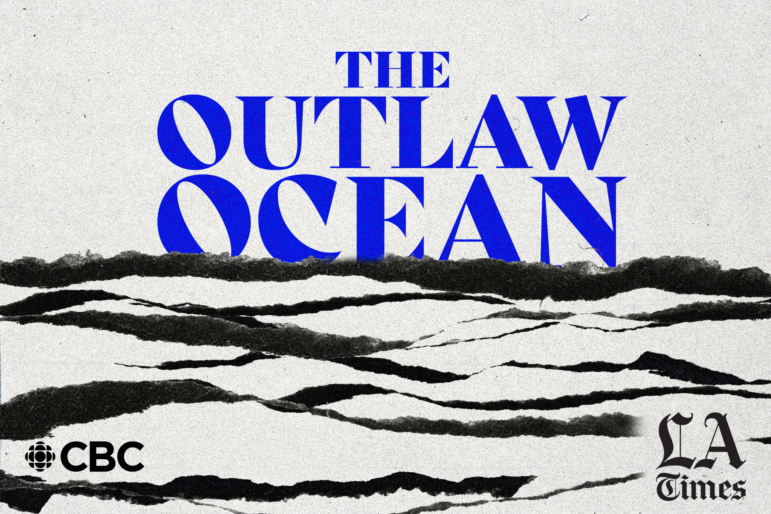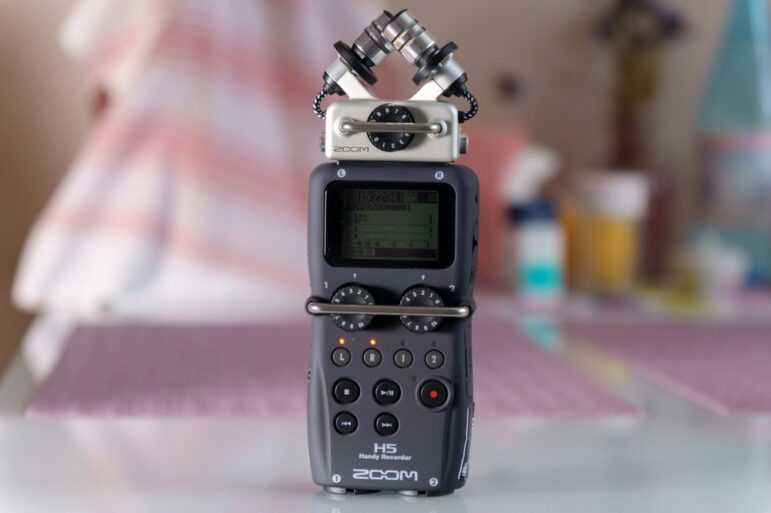

Image: Shutterstock
Global Tour of Investigative Podcasts: 2023 Edition
Read this article in
After years of plenty, more sober times have descended on the world of podcasting.
Major producers have made staff and programming cuts, and the number of new podcasts dropped in 2023, according to Listen Notes, a podcast database.
“Let’s not sugarcoat this,” reported Nicholas Quah in Vulture, “2023 has been a bad year for the podcast world.” Or as one podcast strategist put it to the New York Times’s Reggie Ugwu: “The dumb money era is over.”
Does a drought always come after many years of plenty? It feels like it.
And this year could bring more challenges. A change to the way that Apple records the number of podcast downloads — essentially switching off automatic downloads for irregular listeners — promises to play havoc with audience numbers. Semafor reported recently that as a result of the Apple switch “some of the biggest podcasts in the world saw their official listener numbers drop dramatically.” That, in turn, could impact funding, jeopardizing new series, or leading to titles being axed.
But there is hope, and promise, too. The Reuters Institute’s latest survey found that podcast reach remains stable, and with a loyal audience: a third of people, or 34%, listen to podcasts each month “across a basket of 20 countries.” Among 18-24-year-olds, the figure is 56%, highlighting the promise of a medium that can reach younger audiences where more traditional formats struggle to gain traction. There has also been a surge in African podcasts, they reported, and there are new opportunities in video-led or hybrid podcasts.
AI also promises to shake things up. Spotify has launched a voice translation pilot which sees some of its most popular podcasts translated into additional languages. But this isn’t any old translation, with AI, they say, this can be done in the podcaster’s own voice. Digiday reports that other networks are also testing AI-powered translation, which if it works, could mean podcasts are able to reach into headphones across borders, translated into a listener’s native language, and offering the potential to shake up the Anglo-dominance of the podcast sphere.
“I think this may be our best shot in a while for the podcast industry to globalize — to actually serve up content in-country, in-language around the world,” Conal Byrne, the head of iHeartMedia Digital Audio Group, told Digiday.
In the meantime, and while we worry about the future for translators and voice dubbing artists worldwide, here is our human-powered attempt to bring a global mix of investigative podcasts to your ears: a round up of some of the titles broadcast in 2023 to have been reviewed by GIJN’s global team.
We have chosen podcasts that are investigative in nature, and which dig into environmental crimes, long-forgotten scandals, sexual abuse allegations, and more than one mystery involving a president or presidential candidate. With podcasts from the Nordic countries, Mexico, Spain, France, Germany, and the US, and featuring stories that uncover mysteries in Haiti, Cuba, and Syria, here is our list for 2023.
Cold Front, DR, NRK, SVT, and Yle
- From Denmark, Norway, Sweden, and Finland
- Language: English
This year-long cross-border collaboration between investigative reporters from Denmark, Norway, Sweden, and Finland unravels details of a complex ‘hybrid war’ of Russian influence in Nordic countries, touching on disinformation, spying, and seabed warfare. The team — from DR, NRK, SVT, and Yle — follow various leads gleaned from secret meetings with intelligence sources, in-depth open source research, on-the-ground tracking, and even information shared with them by an anonymous retired British naval intelligence officer who taps into Russian trawlers’ radio communications in his spare time. Particularly of interest is Cold Front’s deep-dive into the events surrounding the Nord Stream pipeline explosions, where the journalists were able to place Russian vessels capable of underwater mapping and seabed operations near the pipeline in the period leading up to the blasts. The numerous substories within this podcast create a complex picture of Russian activity in the Nordic region, and though the narrative is back and forth in nature, the series is unified by a unique, behind-the-scenes storytelling approach that makes the listener a fly on the wall to the methods used in this gripping investigation. — Emily O’Sullivan, GIJN editorial assistant
Inside Tesla, Stern Investigativ/ RTL+
- From Germany
- Language: German
This five-episode podcast series examines the working conditions in Tesla’s gigafactory in Germany’s Brandenburg state. That the multinational electric car giant Tesla chose Germany as the site for its first plant in Europe was a big win for Germany’s aspirations as a center of innovation and had politicians of all stripes succumbing to “Tesla fever.” The factory was bringing thousands of jobs to the state, so Stern Investigativ reporters and podcast hosts Manka Haiser and Christian Esser, along with colleague Tina Kaiser, set about finding out what kind of jobs they would be. After the local authorities and Tesla’s press office stonewalled the journalists’ requests for data on workplace injuries, two reporters went into the plant undercover, working demanding jobs on the assembly line (and on occasion, secretly filming). The team also spoke to current and former employees — despite workers reportedly being “forbidden” from talking to the press — and obtained documents such as leaked injury logs and emails between the company and local labor authorities. As the investigation unfolds the revelations stack up. Digging into everything from worker safety to the plant’s environmental impact, the reporting creates an impression of a pervading culture at the Tesla plant where the product is the priority. — Alexa van Sickle, GIJN associate editor
Historic Lie: The Colosio Case, La Maldita for Podimo
- From Mexico
- Language: Spanish
The name Luis Donaldo Colosio is well-known across Mexico. He was a promising political figure campaigning for systemic change, who was assassinated during a rally in 1994 in the border city of Tijuana. There are many questions about his murder. The reporter Laura Sánchez Ley has dedicated her career to investigating and exposing the inconsistencies and irregularities that surround the sentence of the man who confessed to the crime: Mario Aburto. Over six episodes, listeners hear about Aburto’s life and testimonials in his own voice, including recordings of calls that he made from prison. Sanchez Ley creates an engaging piece that weaves together the evidence she has found, with memories and confessions of her career as a journalist investigating this troublesome case. She has also published a book about the case. — Andrea Arzaba, GIJN Spanish editor
The Empty Grave of Comrade Bishop, The Washington Post
- From US/ Grenada
- Language: English
This six-part podcast by The Washington Post digs into a 40-year-old mystery that unfolded at the height of the Cold War. Six days before the United States invaded the Caribbean island of Grenada in 1983, the murdered body of the country’s beloved prime minister, Maurice Bishop, disappeared, along with the bodies of several cabinet ministers and supporters. In a two-year investigation, the Post’s podcast host, Martine Powers, interviewed dozens of sources and dug into numerous documents to not only track the fate of those remains — the subject of enduring conjecture and grief on the island — but also to reveal the symbolic threat that Bishop’s charismatic leadership posed for Western governments, and the role of the US in the mystery of the disappearance of that revolutionary symbol. For newsrooms, the greatest value of this compelling, narrative podcast may lie in the example of the inspired choice of Powers — who has family roots in Grenada, but who was not a member of any investigative team — as the reporter for the series. As the Post’s head of investigations, Jeff Leen, recently pointed out to GIJN, the podcast illustrates the often neglected power of internal collaboration, in which any contributor to a newsroom — whether a graphics designer or proof reader or delivery driver — can potentially contribute to an investigation, and that investigative editors should always have an open door to their ideas, talents, and source access. — Rowan Philp, GIJN senior reporter.
Buried, BBC
- From: UK/Italy
- Language: English
A deathbed tape leads two reporters to investigate what has been called one of the worst environmental crimes in UK history: a secret one million-ton toxic dump near Derry in Northern Ireland. What did the man in the tape know? This eight-episode podcast digs into his confession to examine how in Northern Ireland, criminals posing as legitimate businesses defrauded local councils. Instead of dealing with the garbage they were contracted to take responsibly, they created a 46-hectare dumping ground that is believed to be one of the largest illegal dumps in Europe. Toxins flow into the river through groundwater, raising concerns about drinking water and the impact on wildlife and farm animals. Politicians describe the situation as a ticking time bomb. Cleaning up the site, which contains everything from asbestos to arsenic, will cost millions. What’s more, across Europe, the illegal dumping of waste has been linked to groups involved in arms and drug trafficking. In this podcast, investigative reporters Dan Ashby and Lucy Taylor, who have covered the ivory trade, dynamite fishing gangs, and rosewood smuggling, turn their focus to the criminal underworld’s relationship with illegal waste. The series takes the duo from Northern Ireland to Italy, where the links between organized crime and refuse has given birth to a new term: ecomafia. — Pinar Dag, GIJN Turkish editor
You Will Not Be Silent (Tu ne te tairas point), Paradiso Media, Slug News
- From: France
- Language: French
When it was first released, this podcast from Paradiso Media and Slug New was quickly labeled as a kind of #MeToo moment for the French Orthodox Jewish community. Two women journalists — Salomé Parent-Rachdi and Lila Berdugo — spent a year-and-a-half investigating this story, and over the course of the project were able to identify three rabbis accused of sexual violence, though they are only identified as numbers during the six-episode series. Beyond collecting the testimonies of the victims, the two journalists unveil the mechanisms of silence and omerta at work: one of the key concerns of the women they speak to is a fear of spreading antisemitism. One of the hosts is also Jewish, and they use the format to share and explore their own doubts and concerns with the audience. In two bonus episodes, the hosts detail the background of their investigation: the difficulties of interviewing and checking testimonies of traumatized victims, and the impact of their work. The findings were picked up by various newspapers and led to more women coming forward. — Alcyone Wemaere, GIJN French editor
The Kids of Rutherford County, WPLN/Nashville Public Radio, Serial/The New York Times, and ProPublica
- From: US
- Language: English
This four-part podcast is narrated by Nashville Public Radio reporter Meribah Knight, and builds upon a previous investigation that she and ProPublica reporter Ken Armstrong reported on back in 2021. What they uncovered was a gross perversion of justice and civil rights in a Tennessee county, in which children as young as seven were being arrested and detained for minor — and sometimes completely made-up — criminal charges. In the podcast, Knight pulls the listener into the Kafkaesque world of the Rutherford County juvenile justice system. Here, a lone judge, who calls herself the “mother of Rutherford County,” de facto demands arrests of children for even the smallest potential infractions and then routinely orders them to be jailed — sometimes in the equivalent of solitary confinement — in the county’s massive juvenile detention center. The result was that, for years, an unprecedented number of minority children in Rutherford County were wrongfully detained in a system that openly violated multiple state laws. The podcast’s narrative arc parallels an underdog legal battle to right these wrongs, and the series culminates with a successful class action lawsuit against the county. But the ending remains bittersweet, as Knight’s reporting reveals just how hard it is to both provide real restitution to those who were harmed and achieve real accountability for those who were responsible, when confronting systemic injustice. — Reed Richardson, GIJN managing editor
Costa Nostra, La Maldita for Amazon Music 
- From: Spain
- Language: Spanish
Spain’s Costa del Sol is a tourist paradise, known for its beaches, crystal blue waters, and nightlife. But this podcast series from the journalist Antonio Pampliega explores the “dark side” of this stretch of coastline, where organized crime groups from more than 50 countries traffic illegal substances and battle with each other for control. Over the course of 10 episodes, the reporter meets drug traffickers, gangsters, and police officers who live and work on these world-famous beaches. The podcast was created by La Maldita, an outlet specializing in film, podcasts, and documentaries based between Madrid and Buenos Aires. — Andrea Arzaba, GIJN Spanish editor
The Sound: Mystery of Havana Syndrome, Project Brazen 
- From: US/Cuba
- Language: English
When news broke in late summer 2017 that dozens of US Embassy staff had been evacuated from Havana, Cuba, due to unexplained symptoms and potential brain injuries arising from exposure to a high-pitched shrieking sound emanating from a suspected sonic weapon, it seemed like the stuff of spy novels. Then what came to be called “anomalous health incidents” started spreading to diplomatic staff around the world, and a new theory, involving a mass psychogenic response, took hold. Former Guardian journalist Nicky Woolf takes a deep dive into this frustratingly elusive story with an eight-part series that examines everything from Cold War spycraft to Caribbean entomology to scientific studies on microwave beams. In the end, Woolf uncovers a fascinating tale that doesn’t fit neatly into any of the proffered theories. But the reporting does strongly suggest that something nefarious was afoot, at least one person was physically targeted, and the US government appears stubbornly resistant to hearing any more about “the sound.” — Reed Richardson, GIJN managing editor
Silenced: The Radio Murders, iHeartRadio and Kaleidoscope 
- From: US/Haiti
- Language: English
Ana Arana, an award-winning correspondent well versed in covering crime and the Latin American drug trade, jumps back into a story that she first investigated three decades ago: a trio of murders among the Haitian emigre community, all radio broadcasters who used their voices to campaign for change back home. Together with co-host Oz Woloshyn, the pair dig into the archives: filing FOI requests, speaking to community members and friends of the men who died, tracking down a judge and a police officer who worked the case, scouring court police reports and court documents. The truth about who masterminded the murders is just as murky in 2023 as it was in Miami’s Little Haiti neighborhood in the 90s, but their investigation weaves historical narrative with questions about a case that was never fully solved, asking why an investigation into attacks that struck such a serious blow to the pro-democracy diaspora could have been allowed to stall. Invoking the novelist William Faulkner, the hosts say in one episode, “The past is never really past,” as they try to explain why digging into historical cases matters. What happened back then, they say, can been seen as a “cipher for what’s happening in Haiti today.” — Laura Dixon, GIJN associate editor
Gay Girl Gone, CBC 
- From: Canada/Syria
- Language: English
When the Arab Spring reached Syria in 2011, Amina Arraf stood out among all the young revolutionaries. Her blog Gay Girl in Damascus, documented her life as a lesbian and activist in a country where homosexuality was illegal. As the host of this podcast says, at the time, that was “a ticket to prison.” Her posts about life in the Syrian capital started to attract a loyal, international readership, but then a post appeared saying Amina had been abducted. Her readers mobilized, desperate to save her, but it soon became clear that everything wasn’t quite as it seemed. In this six-part series, Iranian journalist Samira Mohyeddin investigates the story by interviewing Sandra, who had met Amina online and forged a close virtual relationship with her, and the reporters who investigated her story, retracing the investigations that unveiled the person behind the blog and raising pertinent questions about identity in cyberspace, what we know, and who we think we are speaking to. — Majdoleen Hassan, GIJN Arabic editor
The Last Afternoon in the Garden, Develop Audio
- From: South Africa
- Language: English
Radio is still king in sub-Saharan Africa, but it is offering a pathway for a podcasting culture to emerge and thrive in more developed parts of the continent. Nonetheless, investigative podcasting is still largely a niche area. But few people in Africa have embraced and taken to watchdog podcasting like South African journalist and media entrepreneur Paul McNally. A founder of Alibi Investigations and, later, Develop Audio, McNally spends a considerable amount of his time training investigative podcasters across Africa, but he also likes to show his trainees how the craft is done. In this four-part podcast series produced by a team from Develop Audio with grant support from the Henry Nxumalo Foundation, McNally investigates the assassination of a local leader and land activist, Ayanda Ngila. Using extensive field reporting and descriptive storytelling, McNally helps to capture the growing use of assassinations to settle disputes in South Africa. By the end of McNally’s podcast, the investigation had opened a Pandora’s box into a much more complex social justice story concerning land ownership in a society still trying to heal from the ills of the segregated apartheid system. “My investigation started as looking into an assassination, but became about land ownership in South Africa,” writes McNally in the Mail & Guardian, which serialized the podcast. “I became increasingly aware of what it takes to achieve even small victories against powerful, established forces.” — Benon Herbert Oluka, GIJN Africa editor
 Laura Dixon is an associate editor at GIJN and a freelance journalist from the UK. She has reported from Colombia, the US, and Mexico, and her work has been published by The Times, The Washington Post, and The Atlantic. She has received fellowships from the IWMF and the Pulitzer Center.
Laura Dixon is an associate editor at GIJN and a freelance journalist from the UK. She has reported from Colombia, the US, and Mexico, and her work has been published by The Times, The Washington Post, and The Atlantic. She has received fellowships from the IWMF and the Pulitzer Center.









